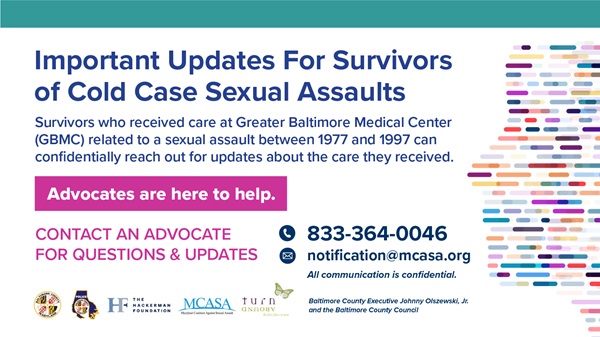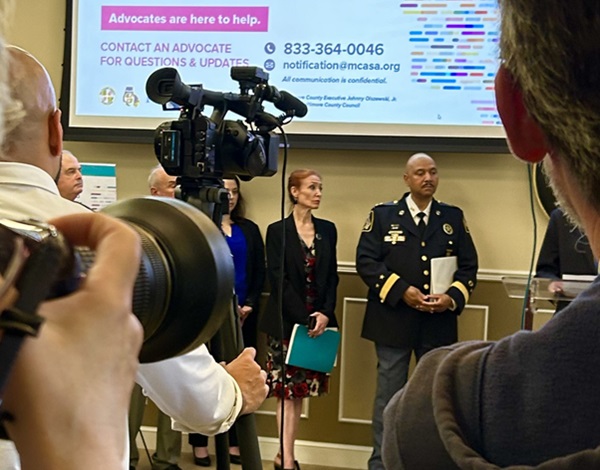TOWSON, MD—County Executive Johnny Olszewski on Tuesday joined Baltimore County Police Chief Robert McCullough, Baltimore County State’s Attorney Scott Shellenberger, TurnAround, Inc., the Maryland Coalition Against Sexual Assault (MCASA), and community leaders to announce a new public awareness initiative appealing to cold case sexual assault survivors between 1977 and 1997 who were treated at Greater Baltimore Medical Center. The effort – prompted by forthcoming evidence-analysis results – encourages survivors to contact partner advocates for information and updates related to their cases.
“We are committed to doing everything possible to bring information, justice and long-awaited closure to sexual assault survivors,” said Baltimore County Executive Johnny Olszewski. “We encourage those looking for answers to reach out to our expert partner advocates who will guide them through the process, connect them with resources and share next steps.”
Survivors can call the Maryland Coalition Against Sexual Assault (MCASA) at 833-364-0046 or email [email protected] to learn more about this project and opt-in to, or opt-out of, receiving information about their sexual assault evidence. This hotline and email support option is open Monday through Friday from 9 a.m. to 5 p.m. Survivors will receive information about options, next steps, and support services including MCASA’s Sexual Assault Legal Institute for discussion of legal options and TurnAround, Inc., Baltimore County’s Rape Crisis Center.
In November 2023, County Executive Olszewski and Baltimore County Police Department Chief Robert McCullough announced a landmark commitment to aggressively expedite testing of cold case sexual assault forensic evidence preserved by GBMC since the 1970s.
“This initiative speaks to the Baltimore County Police Department’s level of commitment to deliver justice on behalf of all survivors of sexual assault,” said Police Chief Robert McCullough. “You are not alone. I urge all the survivors to contact our partner advocates for support and assistance.”
Since November 2023, 1,408 cold case slides from 1977 to 1997 have been subpoenaed by Baltimore County Police Department’s Special Victims’ Unit and transported to police headquarters. Currently, more than 1,000 slides have been sent to a lab for DNA testing and will be continually processed as lab capacity allows. All slides will be tested by the end of 2024 thanks to a $1.5 million grant from the Governor’s Office of Crime Prevention, Youth, and Victim Services and a grant of up to $500,000 from the Hackerman Foundation,
“Dr. Breitenecker was a pioneer and decades ahead of his time when he began to collect and save forensic evidence and many victims of sexual assault have already received a resolution to their case due to his work,” said Baltimore County State’s Attorney Scott Shellenberger. “This new process will bring added closure to the victims in these cases.”
“MCASA supports survivors and their rights to know about their DNA evidence and rape kit, whether the evidence was collected in decades ago or yesterday,” said MCASA Executive Director Lisae Jordan. “We are grateful to Dr. Breitenecker for his visionary work and we will work tirelessly to support the survivors he sought to help. Survivors can contact our SAKI project for help with information about legal rights, referrals and the status of their slides.”
“Our goal is to empower impacted survivors and to ensure their voice is central to this process,” said TurnAround, Inc. Executive Director Amanda Rodriguez. “These survivors took meaningful steps, with hope, that someday justice would be served in their case – and now there is a chance for them to realize that hope. Victim engagement is key. We want to give them back power in a situation where to date they have had none.”
In the 1970s, GBMC emergency room physician Dr. Rudiger Breitenecker recognized the value of evidence from sexual assault survivors and preserved evidence of more than two-thousand sexual assaults on microscope slides. The late Dr. Breitenecker continued this collection practice into the early 1990s when his efforts led to the formation of the GBMC Sexual Assault Forensic Evidence (SAFE) program, one of the most robust and respected programs of its kind in the nation.
These slides were maintained at GBMC and have proven viable for DNA testing which have led to the arrest of an offender for several decades-old crimes.
The new resources toolkit is available online here.

Photo via Baltimore County Police Department


